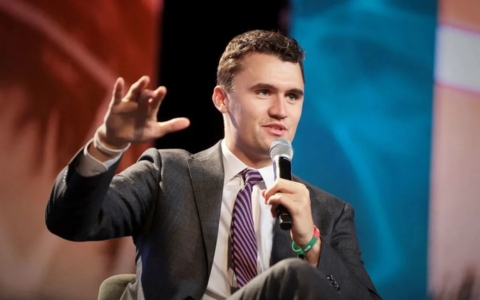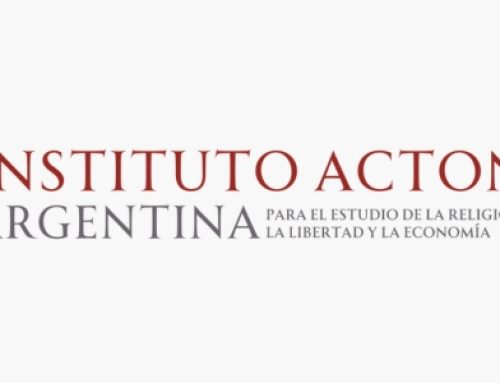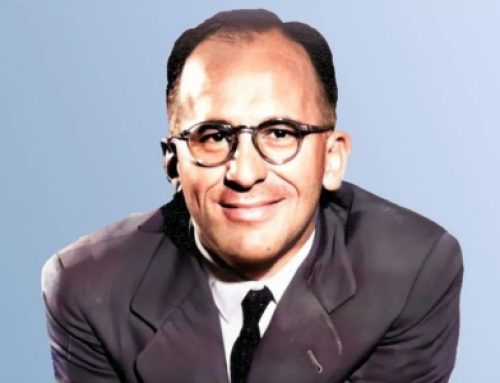Por: Bishop Robert Barron
Fuente: FIRST THINGS
15 de septiembre de 2025
Why has the murder of Charlie Kirk resonated so powerfully through the culture? Is it because he was cut down so brutally in his prime? That he left behind a wife and two very young children? That no one deserves to die that way? Certainly for all of those reasons. But I am convinced there is something more, and it has to do with the fact that he died with a microphone in his hand—not a gun or a knife or a grenade, but a microphone.
Charlie Kirk’s method, which he practiced on college campuses all over the country, was to invite into a public dialogue people who disagreed with him. You can watch him at work on thousands of videos on YouTube. You’ll notice that he doesn’t duck hard questions and that he engages his interlocutors respectfully, even when he’s articulating a position radically contrary to theirs. Just a few months ago, I texted him with a word of congratulation after I saw him manage, with grace and a smile, an army of woke college kids who, to put it mildly, were pretty obnoxious to him.
In employing this method, Charlie was standing in a venerable tradition that stretches back to ancient times and provides one of the foundations of Western civilization. In the streets and byways of fifth-century b.c. Athens, Socrates spoke, especially to the young, not through diatribes, but through conversations. He asked probing questions, criticized the answers he received, pressed his opponents to formulate their views more exactly, admitted when he hadn’t seen something important, and so forth. Socrates’s greatest disciple Plato gave us, in his famous dialogues, a literary version of these complex conversations. And Plato’s mentee Aristotle cultivated a philosophical school called “peripatetic,” since the learning took place as teacher and student walked together while sharing their points of view. A version of this can be seen in the Oxford and Cambridge university tradition, whereby the real learning takes place not so much through formal lectures as through the back and forth between individual tutors and pupils.
If Athens is one of the bedrocks of Western culture, the other is surely Jerusalem. And within that explicitly religious ambit, a similar method is on display. In a Jewish context, learning classically happens in the spirited conversations that two students have as they wrestle together with the Scripture or the Talmud. As they speak to one another, furthermore, they are referencing opinions of rabbis and scholars from across the centuries. There is a Christian version of this in the work of my intellectual hero, St. Thomas Aquinas. In the universities of the Middle Ages, learning took place principally through what were called quaestiones disputatae (disputed questions). These were public exercises in which a master such as Aquinas would lay out his resolution of an issue and would subsequently entertain objections—sometimes dozens or hundreds—and finally respond to the objections one by one. I know that the texts of Thomas can seem dryly rational, but we must see them as literary reproductions of these lively, often cantankerous, debates. And to be sure, this tradition of truth-seeking through conversation thoroughly conditioned our Founding Fathers, who built an entire political system on dialogue, debate, and freedom of speech.
There are two basic assumptions that undergird this dialogic method, namely, the dignity of the human person and the objectivity of truth. Allow me to consider each in turn. If one doesn’t believe in the dignity of the individual, then the best way to get everyone to agree is simply to brutalize or eliminate one’s opponents. In my own lifetime and in the lifetimes of my parents, this was on clear and awful display in the totalitarianisms of Hitler, Mao, Stalin, Pol Pot, and Castro. Powerful figures didn’t dialogue respectfully with their interlocutors; they threw them in jail, tortured them, or killed them. But if one holds to the intrinsic value of each human being, one will use words rather than guns, arguments rather than threats.
The second assumption is that there is a rational structure to the world and hence objective values, both epistemic and moral, to which one can appeal when speaking to an opponent. If there is no such structure to which the two interlocutors can appeal, their argument will devolve into a shouting match. Think of a group of kids who endeavor to play baseball but without a common understanding of the rules of the game. They won’t play at all; they will, in very short order, start to fight.
Now permit me to take one more important step. Both of the assumptions under consideration are themselves predicated upon an even more fundamental axiom, namely, the existence of God. Why do we hold to the dignity of the individual? Thomas Jefferson knew: “We hold these truths to be self-evident, that all men are created equal, that they are endowed by their Creator with certain unalienable rights.” Take the Creator out of that famous formula, and its logic collapses. We revere the individual human being because we are convinced, consciously or unconsciously, that he or she is a beloved child of God. And why do we think there is a shared framework of meaning? We do so because we believe that the intelligibility of the world (upon which all the sciences rest) and the objectivity of moral value (upon which all coherent moral conversations rest) are grounded in a Creator God who gave rise to them. We hold, in short, for a transcendent norm by which truth and goodness are measured.
So what happens when the existence of God is denied or when the practice of religion fades away? What happens is that the conditions for the possibility of civil conversation are fatally compromised. And haven’t we seen, sadly enough, ample evidence of this? To my mind, the single ugliest consequence of Charlie’s murder is the plethora of videos celebrating his death. And these are coming not just from weirdos in the fever swamps of the internet, but, in alarming numbers, from teachers, professors, professionals, medical personnel, and government officials. I don’t care how dramatically you might disagree with someone; if you celebrate his murder, you have lost any sense of the dignity of that person. And don’t we see, especially among the young who have been soaked in woke ideology, a sense that there are no objective norms of good and evil, truth and falsity, just plays of power between oppressor and oppressed? Just the other day, I came across a deeply disturbing statistic: 34 percent of college students feel that it is sometimes permissible to respond to campus speech with violence. That point of view makes sense if and only if one has given up completely on a shared matrix of meaning. If argument is pointless, bombs and bullets become inevitable.
I cannot help but see a correspondence between that awful stat and the steady increase in disaffiliation from the churches, especially among the young. When people stop going to church, they stop thinking about God, they stop praying, they don’t hear about the Ten Commandments, they don’t attend to the cry of the prophets on behalf of the poor, they don’t read the Sermon on the Mount, they don’t take in “whatsoever you do to the least of my brothers, you do it to me.” And when none of that is assimilated, people stop believing that their brothers and sisters should be cherished and that a morality beyond the clash of wills is possible.
To this last point, I would like to make reference to the famously controversial speech that Pope Benedict XVI made to his former academic colleagues at the University of Regensburg in 2006. Setting aside his mention of Islam, which garnered all the negative press, I would direct your attention to the gravamen of his argument, which was Christianity’s crucial prioritizing of Logos over will. Since Jesus is described as the Logos of God, Christianity, he argued, has confidently reached out to any science or philosophy or cultural viewpoint that holds to the principles of reason. On the other hand, when will is emphasized at the expense of reason, dialogue tends to devolve into oppression and violence, one will simply asserting itself against another. I firmly believe that this voluntarism (to give it its proper philosophical designation) is a mark of the skeptically postmodern culture in which so many people today are formed. And the results are exactly as Pope Benedict predicted.
All of this brings me back to Charlie Kirk. Up until his dying moment, Charlie was engaging in a practice that goes back to Socrates and that informs the West at its best. And that is precisely why we all feel so unnerved by his death. We sense that something basic to our civilization, something axiomatic and fundamental, is teetering—and that truly fetid cultural influences have found their way into our institutions and the minds of our kids. My sincere hope and prayer is that we can take renewed inspiration from a courageous and religious man who died, not with a gun in his hand, but rather an instrument of communication.





Deja tu comentario